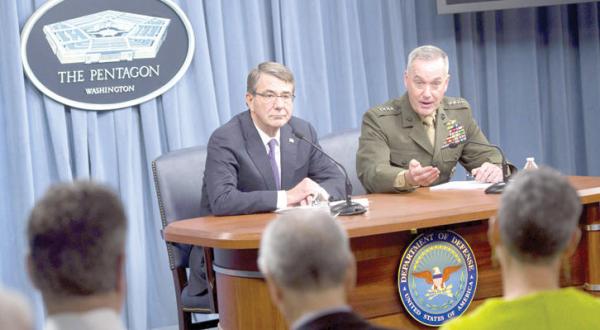The U.S. military’s top general said Thursday that the Libyan government is in a “period of intense dialogue” that could lead in a short period of time to an agreement in which U.S. military advisers will be deployed there to support in the fight against ISIS.
“There’s a lot of activity going on underneath the surface,” said Marine Gen. Joseph F. Dunford, chairman of the Joint Chiefs of Staff. “We’re just not ready to deploy capabilities yet because there hasn’t been an agreement. And frankly, any day that could happen.”
Dunford spoke to few journalists on his way back from Brussels to the United States, where he met with military chiefs this week from several NATO nations. There is interest among some NATO nations in joining in the mission, Dunford said, but specific details of who shall be taking part is still unclear for the meantime.
The focus of the operation will likely be on training and equipping militias loyal to Prime Minister Fayez Sarraj, the leader of the new Libyan Government of National Accord (GNA), which is supported by the United Nations. Dunford further said that NATO will need an approved request from the government to get involved and expected a long-term mission in Libya.
A small number of U.S. Special Operations troops have been deployed to the Libyan cities of Misrata and Benghazi to evaluate as who could be partners for U.S. forces since late last year, U.S. officials acknowledge. Dunford also highlighted a unique U.S. contribution to the effort, however declined to comment on their operations.
The advising mission could be complicated by different political reasons, apart from security concerns. For instance Sarraj’s government has not yet been accepted by either existing rival government in Libya, the Tripoli-based General National Congress (GNC) and the elected House of Representatives in the eastern part of the country. Moreover the the Libyan mission’s coalition leadership structure still isn’t clear.
Matteo Renzi, Italian Prime Minister, has ruled out a large “invasion” of Libya, noting that reports emerged this week that Renzi was backing out of deploying troops in support of the U.N.’s support mission in Libya, although on the contrary Defense Secretary Ashton B. Carter said early this month that he anticipated the Italian government would take the lead in it.
Thus, asked about the probability of Italy taking steps back from the Libya mission, Dunford said Thursday that he spoke to their chief of defense, Gen. Claudio Graziano, this week and did not anticipate that would be the case, adding that the Italian government is still doing planning however has set conditions for getting involved.
The U.S. dialogue with the unity government has been led by U.S. Ambassador to Libya Peter W. Bodde and Jonathan Winer, the State Department’s special envoy for Libya. Winer expects the unity government to ask for aid to train and equip soldiers to fight ISIS, as well as to receive it, he stated through a Tweet on Thursday.
On Monday, the United States and international partners announced in Vienna that they are ready to afford humanitarian, economic and security assistance if demanded, in addition to weapons.
Army Gen. David Rodriguez, the chief of U.S. Africa Command, said Tuesday that officials are now waiting to see how the U.N. examines the Libyan request, which must include details about who will receive weapons.
“The support for the GNA and how they need it and how they want it, we’ll just have to see how that develops over time,” Rodriguez said, speaking of the Libyan government.
